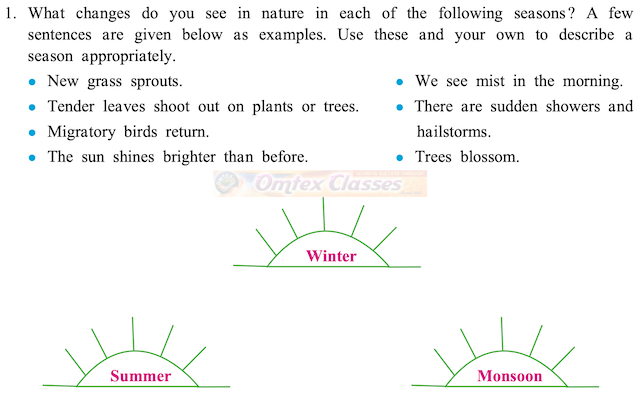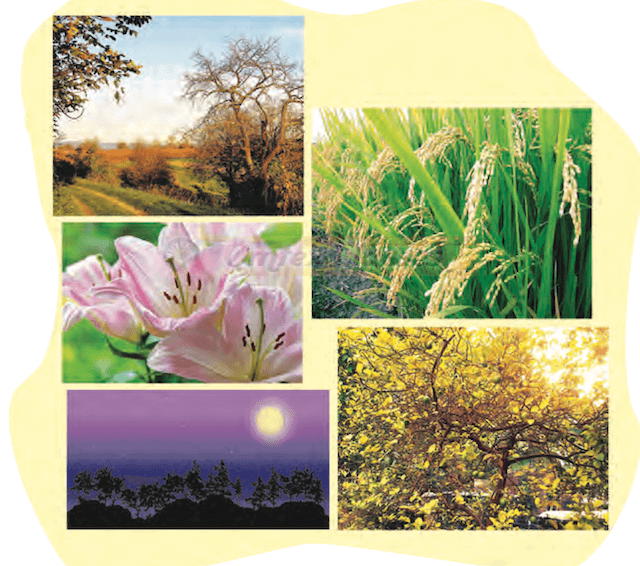Chapter 3: Autumn

What changes do you see in nature in each of the following seasons? A few sentences are given below as examples. Use these and your own to describe a season appropriately.
New grass sprouts
Tender leaves shoot out on plants or trees.
Migratory birds return.
The sun shines brighter than before.
We see the mist in the morning.
There are sudden showers and hailstorms.
Trees blossom.
SOLUTION
Summer
Sun shines brighter than before.
birds nest and raise their young in summer.
summer is the perennial tree fruiting season.
summer is a great time for insect activity
Winter
migratory birds return
we see fog in the morning
plunging temperature and icing weather
time for animal hibernation.
Monsoon
there are sudden showers and hailstorms
tree blossoms
tender leaves shoot out on plants or trees
new grass sprouts.

Name the six seasons according to the Indian calendar. Which of the seasons is equivalent to Autumn?
SOLUTION
The seasons according to the Indian calendar are Vasant, Grishma, Varsha, Sharad, Hemant, and Shishir I Shita. The season equivalent to Autumn is Sharad.

What changes do we see in the life of human beings when the season changes? Write with reference to their
clothes
diet
celebrations.
SOLUTION
We see a lot of changes in nature when the season changes. We make many changes in our lives too.
1. Clothes: During summer we wear cotton garments as they can soak the sweat and make the summer heat bearable. In the monsoon season, we wear clothes made from synthetic materials as they do not soak water and dry up quickly. Woollen sweaters and overcoats keep us warm in the winter season.
2. Diet: During summer one must have cooling food that will balance our diet, keep our energy level stable, and keep us well hydrated. Whereas in winter and monsoon season one should have healthy food and avoid overeating as one may have more food cravings during winter. One can rely on fruits, oats, and soups.
3. Celebration: Indian festivals are celebrated during different seasons of the year.
Guess what is personified and fill in the gap. Choose from the given alternatives.
The weary ______________ was also petrol - hungry.
OPTIONS
Sun
alarm
bird
car
wind
stars
machine
The playful _____________ whistled among the trees.
OPTIONS
Sun
alarm
bird
car
wind
stars
machine
The annoying ______________ screamed at 5 am.
OPTIONS
Sun
alarm
bird
car
wind
stars
machine
The naughty ___________ winked at me from above.
OPTIONS
Sun
alarm
bird
car
wind
stars
machine
The rising ______________ stretched its arms.
OPTIONS
Sun
alarm
bird
car
wind
stars
machine
The cheerful ___________ sang as it perched on a tree.
OPTIONS
Sun
alarm
bird
car
wind
stars
machine
The tireless ______________ hummed as it worked hard.
OPTIONS
Sun
alarm
bird
car
wind
stars
machine
Find three lines, that contain images of nature in the autumn season.
During daytime
_______________________
_______________________
_______________________
SOLUTION
During daytime
With nodding rice - stems in her hai
In flowers of grasses, she is clad
Birds greet her with their cooing glad.
At night
______________________
______________________
______________________
SOLUTION
At night
A diadem adorns the night
Her silken robe is white moonlight
Of multitudinous stars.

Pick out words from the poem that describe the following. List them in Column ‘A’. Substitute each of those describing words with another word/phrase of the same meaning.
SOLUTION

Find one example of the following given below from the poem:
Simile.
SOLUTION
Simile
Example: Birds greet her with their cooing glad, Like bracelets' tinkling song.
Metaphor
SOLUTION
Metaphor
Example: Her silken robe is white moonlight.

Write the rhyme scheme of the poem.
SOLUTION
The rhyme scheme of the poem is abab, cdcd, efef, ghgh.
Think and write in your own words.
Why is the maiden Autumn said to wear rice stems in her hair?
SOLUTION
With the onset of Autumn, rice plantation with their fresh stems are fascinating to look at and that's why the poet says the maiden autumn wears rice stems in her hair.
How can the tender maiden Autumn become a full-grown woman? What change in nature does this imply?
SOLUTION
With the advent of Autumn, there are several changes in the season, plants shed their leaves at the beginning of the season. But towards the end of the season plants starts fruiting, the brightly lit evening moon and clear sky help the farmers harvest their crop, birds nest and raise their young ones so nature becomes completely bountiful and mature.
Why do you think, birds greet the autumn season gladly?
SOLUTION
Birds greet the Autumn season gladly as it is the favourable season for them to nest and raise their young ones.

Compare the Indian Monsoon season to a powerful king of a prosperous kingdom. Write down a few similarities. Use them to compose a poem of your own.
SOLUTION
Do it Yourself.

Which is your favourite ‘Nature’ poem from your mother tongue? Write the poem and try to translate it into English. Your translation can be in the form of a poem or a paraphrase.
SOLUTION
Do it Yourself.

Read the ode ‘To Autumn’ by the famous poet John Keats. ‘Season of mists and mellow fruitfulness...’
SOLUTION
Do it Yourself.
Balbharati Solutions for English Kumarbharati 9th Standard Maharashtra State Board
• Chapter 1.2: A Synopsis-The Swiss Family Robinson
• Chapter 1.3: Have you ever seen...?
• Chapter 1.4: Have you thought of the verb ‘have’
• Chapter 2.2: A True Story of Sea Turtles
• Chapter 2.3: Somebody’s Mother
• Chapter 2.4: The Fall of Troy
• Chapter 2.6: The Past in the Present
• Chapter 3.2: Reading Works of Art
• Chapter 3.3: The Road Not Taken
• Chapter 3.4: How the First Letter was Written
• Chapter 4.2: The Storyteller
• Chapter 4.3: Intellectual Rubbish
• Chapter 4.4: My Financial Career
.







